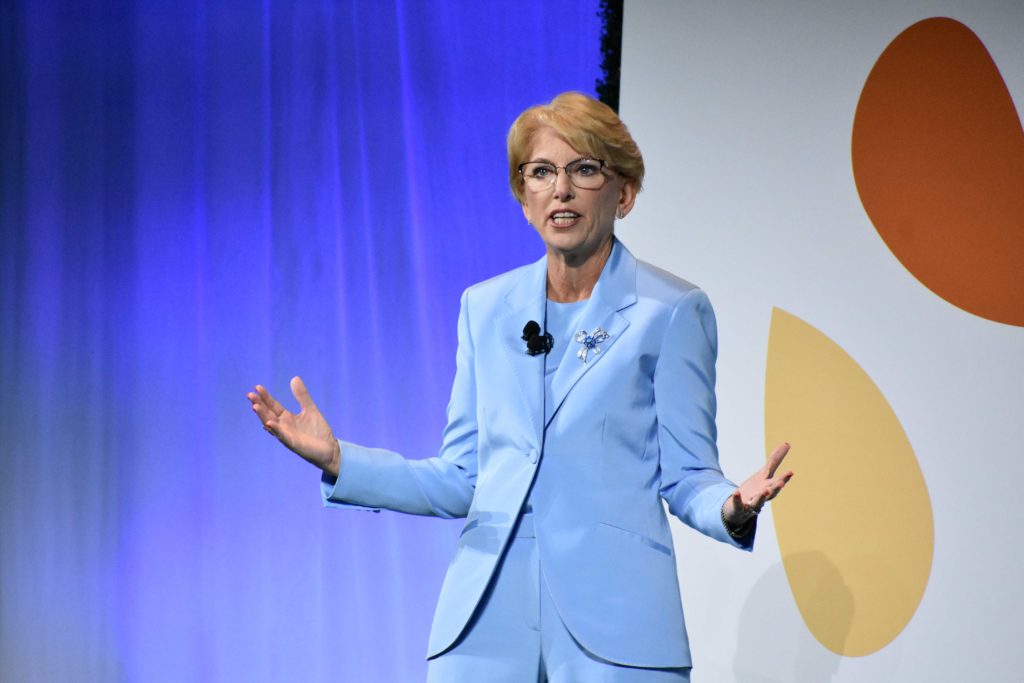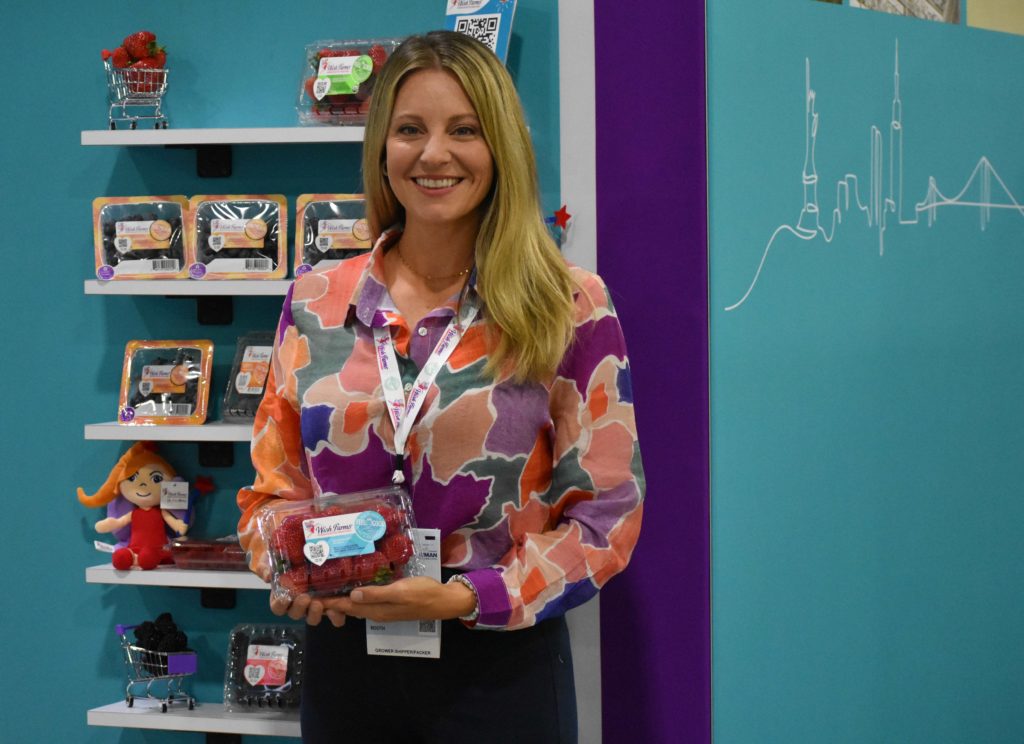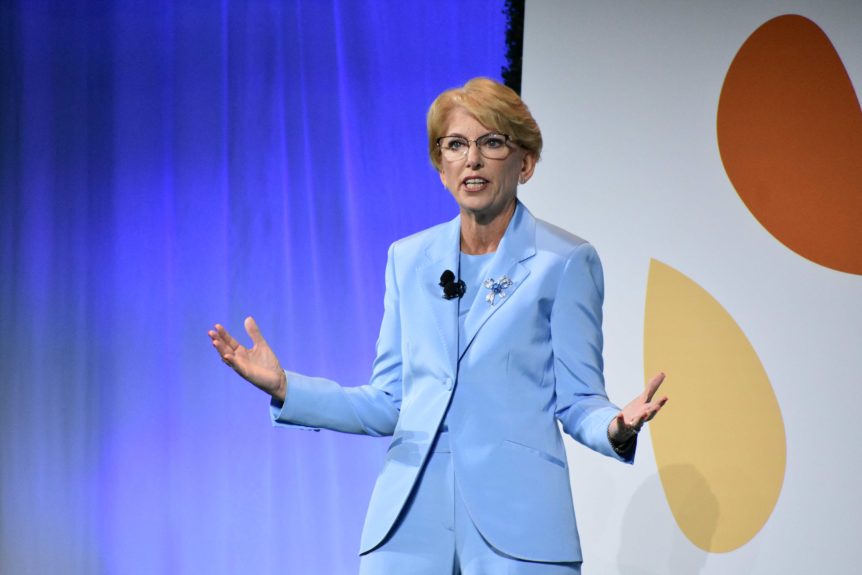By Clint Thompson
The International Fresh Produce Association (IFPA) remains committed to “fighting for fresh.” IFPA serves as a strong advocate for farmers and strives to increase consumption of specialty crops around the world.

Photos by Clint Thompson
Cathy Burns, chief executive officer of IFPA, shared her organization’s message during the Global Produce and Floral Show in Atlanta in mid-October.
“We’re going to fight for fresh, because fresh is worth fighting for. We are all expected to eat 400 grams of fruits and vegetables every day, and we are far below that, not only in the U.S. but around the world,” said Burns, who is also a co-chair of the Specialty Crop Farm Bill Alliance. “As an organization and a community, we need to really advocate for programs and policies that drive consumption around the world. But we also have to remove barriers to ensure people have access.”
If IFPA is advocating for more consumption of nutritious fruits and vegetables, that’s a win for Southeast growers who produce year-round.

“I think continuing to grow a consistent, high-quality product, that’s what consumers are looking for the most. As we continue to advocate for programs, especially in schools, that’s really critical,” Burns said.
Rise of AI
Her message also highlighted the importance of artificial intelligence (AI) and its implementation on the farm. In an era where input costs are as high as they’ve ever been, producers need technological advancements to remain sustainable.
“The adoption and acceleration of artificial intelligence is going to be very important for our industry. It’s going to be worth about $100 billion at the farm level as people begin to implement it,” Burns said. “We have to be able to keep pace with those innovations, because climate change is a serious challenge. As you think about what’s happening with the global mean temperature around the world, we need to make sure that we have crops we’re able to grow and people to be able to work the fields in a way that’s sustainable.
“Not only do we need to feed our current population, but we also need to feed the growing population. At the end of the day, we need to be eating more fruits and vegetables.”
Getting Down to Business
Less than two weeks after Hurricane Milton hit Florida, many of the state’s fruit and vegetable farmers and organizations attended the Global Produce and Floral Show on Oct. 17–19.
For some, like Sue Harrell, director of marketing for the Florida Strawberry Growers Association, it was an opportunity to provide a sense of calmness after the storm.
“This is a huge show. We need to have our presence here and make sure they know that Florida’s in business after that hurricane we just had. We don’t want any of the salespeople to get nervous,” Harrell said. “Our varieties can withstand all different types of weather conditions. Our breeding program is very good at that. We’re hoping to thrive this year and be successful no matter what Mother Nature brings us.”
Wish Farms
One of the mainstays of the show has been the presence of Wish Farms, a Florida-based producer of strawberries, blueberries, blackberries, raspberries and pineberries. Its representatives have attended the show for the past 15 years.
Amber Maloney, Wish Farms director of marketing, believes the event provides an important opportunity that her company needs to take advantage of.
“We have customers across the country and into Canada. We’re meeting with retailers, so that’s a big part of the show for us. It’s also an opportunity to meet with our import partners and exporters that we work with,” Maloney said. “So much of our business is done over the phone and even more so through email, so a show like this is a chance for our team to get that face time that we don’t get very often. We’re meeting in person, talking about the upcoming season and making plans to get people excited about the Florida season. With the show being at the end of October every year, it’s the perfect time to start talking about Florida strawberries and our program in the Southeast.”
Vidalia Onions
Another strong commodity presence at the show is Georgia’s Vidalia onion crop. Multiple farming operations were in attendance, including G&R Farms in Glennville, Georgia. The farm has 700 acres and contracts another 700 with other producers.
Steven Shuman, general manager and vice president of sales at G&R Farms, discussed the show’s importance to his company’s marketing strategy every year.
“Vidalia onions have been a staple, especially in the southeastern part of Georgia. We come back every year and get to see a lot of our current customer base and connect with them at the show. We also come to try to gain new business and new customers, and we can network with people who have new innovative technology and things we may want to add to our operation,” Shuman said. “There’s a lot of networking to do. IFPA creates a great opportunity for us to do that.”
Adam Lytch, with L&M Family Farms, attended the show for the 19th straight year. His company values the event whether it is held in the east in Atlanta, Georgia, or the west in Anaheim, California, where it will be next year.
“There’s a lot of regional events and shows that we love as well, but this is the one chance annually to connect with everyone, not just nationwide but internationally as well. A lot of suppliers, seed companies and customers from all over the world are here,” Lytch said.










